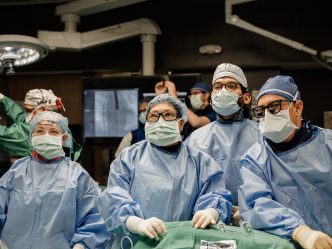AUGUSTA, Ga. – A stroke strikes about every 40 seconds. But new research demonstrates that people with brain bleeds are more likely to survive if they’re treated at a Comprehensive Stroke Center.
Georgia Regents Medical Center – the first hospital in the Peach State to achieve Advanced Comprehensive Stroke Center designation from the Joint Commission – was recently reaccredited and remains the only such center outside Atlanta in Georgia.
“We are very excited to achieve recertification – once again, confirming the high level of care we are able to provide to the most complex and most severe stroke patients,” said Dr. Jeffrey Switzer, Director of Telestroke, Teleneurology, and the Comprehensive Stroke Center.
“Research recently published in the New England Journal of Medicine and the American Heart Association Journal shows that Comprehensive Stroke Centers improve outcomes in both ischemic and hemorrhagic stroke, making them a lifeline for patients in jeopardy,” said Switzer, an Associate Professor of Neurology at Georgia Regents University’s Medical College of Georgia, who also studies acute stroke treatment and related issues.
Comprehensive Stroke Center certification was developed in collaboration with the Brain Attack Coalition and the American Heart Association/American Stroke Association. There are roughly 80 centers in the U.S. equipped with the resources, including neurological critical care and 24-hour availability of neurosurgeons, to deal with the most severe strokes.
“Maintaining this designation demonstrates the ongoing commitment of GRHealth to high quality and superior outcomes for patients under our care,” said Dr. Kevin C. Dellsperger, Vice President and Chief Medical Officer for Georgia Regents Health System. “Through a close partnership with our local Emergency Medical Services, the staff and physicians in our Emergency Department, Departments of Neurology, Neurosurgery, and Radiology, we are uniquely poised to provide timely and superior care to the citizens of this area with acute stroke.”
Stroke is a leading cause of death and serious long-term disability in the U.S. and especially Georgia, which is located inside the stroke belt.
For more information on The Joint Commission and American Heart Association’s Advanced Certification for Comprehensive Stroke Center and a complete list of CSC hospitals in the U.S., visit jointcommission.org or heart.org/myhospital.
Telestroke Care
Georgia Regents Medical Center extends quality stroke care to rural patients across the region through REACH Health, Inc., a telemedicine program pioneered in 2003 at GRU’s Medical College of Georgia. This hub-and-spoke network allows stroke specialists at Georgia Regents Medical Center (the hub) to diagnose and treat stroke patients remotely at more than a dozen rural and a few larger community hospitals (the spokes) in Georgia and to transport those in need of surgery or more specialized neurointensive critical care to GRMC.
Current spoke hospitals are Barrow Regional Medical Center, Burke Medical Center, Emanuel Medical Center, Fairview Park Hospital, Jefferson County Hospital, John D. Archbold Memorial Hospital, Optim Medical Center-Jenkins, St. Mary’s Hospital, St. Mary’s Good Samaritan Hospital, Tift Regional Medical Center, University Hospital and University Hospital-McDuffie, Washington County Regional Medical Center, West Georgia Hospital, Wills Memorial Hospital, and Aiken Regional Medical Center in South Carolina.
GRHealth also has a partnership with the St. Joseph’s/Candler Network in Savannah to provide stroke consultations for St. Joseph Hospital, Candler Hospital, Appling Healthcare System, Candler County Hospital, Coffee Regional Medical Center, Effingham Health System, Evans Memorial Hospital, Optim Medical Center-Tattnall, and Wayne Memorial Hospital
 Augusta University
Augusta University



